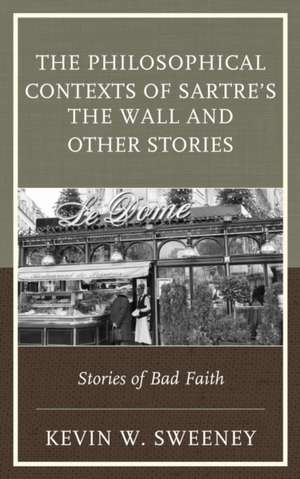The Philosophical Contexts of Sartre S the Wall and Other Stories
Autor Kevin W. Sweeneyen Limba Engleză Hardback – 25 mai 2016
Preț: 594.68 lei
Preț vechi: 772.31 lei
-23% Nou
Puncte Express: 892
Preț estimativ în valută:
113.80€ • 123.58$ • 95.60£
113.80€ • 123.58$ • 95.60£
Carte tipărită la comandă
Livrare economică 22 aprilie-06 mai
Preluare comenzi: 021 569.72.76
Specificații
ISBN-13: 9781498509367
ISBN-10: 1498509363
Pagini: 156
Dimensiuni: 152 x 229 x 17 mm
Greutate: 0.34 kg
Editura: Rowman & Littlefield
ISBN-10: 1498509363
Pagini: 156
Dimensiuni: 152 x 229 x 17 mm
Greutate: 0.34 kg
Editura: Rowman & Littlefield
Cuprins
Chapter One: Philosophical Ideas in The Wall and Other Stories Resistance to Finding Philosophical Contexts in Sartre¿s Stories Strategy for Interpreting the Five Stories Bad Faith and its Philosophical Foundations Emotions and Feelings The Four Examples of Bad Faith in Being and Nothingness Conclusion
Chapter Two: Bad Faith and Responsibility in ¿The Wall¿ Constant and Kant in ¿The Wall¿ The Prisoners¿ Trials The Night in the Cell Pablös Disengagement and Husserl¿s Epoché Pablo Considers the Falangistas¿ Offer Pablo Faces a Kant Situation The Significance of Pablös Laugh/Cry
Chapter Three: Eve in Sartre¿s ¿The Room¿: The Freudian Censor in Bad Faith Freud¿s Topographical Theory of the Psyche
Sartre¿s Critique of Freud¿s Topographical Theory
Charles Darbédat Visits His Daughter Eve and Her Husband Pierre
Between Father and Husband: Eve¿s Role As Censor
Is Eve in Bad Faith?
Conclusion
Chapter Four: ¿Erostratus¿ and Descartes¿s Example of Hats and Coats
The Downward Perspective
Descartes¿s Example of Hats and Coats
The Significance of Hilbert¿s Fainting
Hilbert¿s Revolver and His Gloves
The Significance of the Laugh/Cry
Erostratus and His Plan
The Letter and Hilbert¿s Hatred of Humanity
Playing the Role of the Violent Killer
Trying to Kill on the Street
The Victim and His Look
The Plan Goes Awry
Conclusion
Chapter Five: Knowledge of One¿s Emotions in ¿Intimacy¿ Lulu¿s Stream of Consciousness and Her Ambivalence Purity and Lulu¿s Aversion to Bodies Rirette Waits for Lulu at the Dôme Lulu Arrives and Tells Rirette Her Tale The Scene with Henri on the Sidewalk Lulu Alone in Her Hotel Room Henri and Lulu Are Miserable Lulu¿s Letter and Rirette¿s Bitter Regret Conclusion
Chapter Six: The Existential Childhood of a Leader Lucien¿s Infancy Lucien and His Body Lucien in Paris Lucien¿s Friendship with Berliac and Bergère Lucien Goes Back to Férolles Lucien Meets Lemordant Lucien Becomes a Camelot
Conclusion
Chapter Seven: Bad Faith in The Wall and Other Stories
Bibliography
